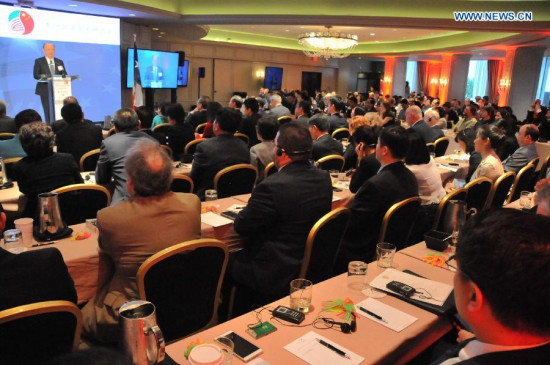
Photo taken on May 12, 2015 shows the scene of the Sixth China-US Relations Conference in Houston, the United States. Around 400 scholars, officials and business leaders from China and the United States gathered at a conference Tuesday to discuss how the two countries could work together to fight global infectious diseases. (Xinhua/Wang Hongbin)
The international community should cooperate in fighting epidemics like Ebola and addressing global health challenges, Chinese and U.S. experts and policymakers said in Houston, the United States on Wednesday.
At a panel discussion that wrapped up the sixth China-U.S. Relations Conference, two Chinese physicians and their American counterparts shared their own experience in dealing with the recent outbreak of Ebola, which affected not only West Africa but also the U.S. state of Texas.
David Lakey, former Texas public health chief, and Edward Goodman, an epidemiologist with Texas Health Presbyterian Hospital of Dallas, recalled the moment they heard of the first confirmed case of the disease in the hospital and how critical coordination work turned out to be.
"We were unable to fly the patient's blood samples to the headquarters of U.S. Centers for Disease Control and Prevention in Atlanta, Georgia, because of state regulations. So we had to do with road transportation. It was two days later that the test result came, showing positive," Goodman said.
So, even within the same country, it was much hassle for different states and different authorities to coordinate.
"It was not only a health problem. It took all components of a government to work," chimed in Lakey, who was in charge of the state public health department at the time.
A Liberian visitor named Thomas Eric Duncan was the first diagnosed Ebola patient on U.S. soil, who passed the virus to two nurses treating him at the Dallas hospital. Duncan died while both nurses recovered.
In West Africa, where Ebola hit hardest, international aid and cooperation saved lives.
Long Yun, a physician with Peking Union Medical College Hospital who was dispatched by the Chinese government to Guinea last September, recounted the dire need of medicine, trained staff, and healthcare infrastructure there.
"It dawned on me that besides aid, international cooperation is vitally important for efforts to help those underdeveloped countries. The United States has the best laboratories and research institutions while we have frontline operational experience. We should work together," Long said.
Liang Mifang, a researcher with the Chinese Center for Disease Control and Prevention, echoed Long.
"Global cooperation is pre-requisite to containing global epidemics. We learned our lessons from SARS," Liang said. She went on to detail what the Chinese government did in the wake of the Ebola outbreak in West Africa and how that mechanism worked.
"You cannot simply block the borders and mind your own business. Rather you have to act proactively. You have to go to the frontline, to get to know the disease and to work with others," she said.
Wednesday's conference was created by former U.S. President George H. W. Bush in 2003 to establish cooperation and forge closer ties between China and the United States.
The two-day conference, themed "Global Infectious Diseases: Prevention, Preparedness, and Response", was attended by some 400 physicians, scientists, policymakers, government officials and business leaders interested in learning how the two countries might develop a global strategy to prevent emerging worldwide infectious diseases and epidemic threats.
















































